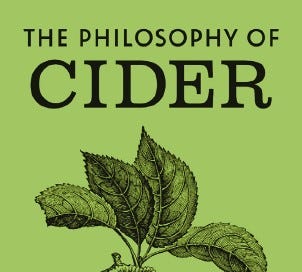Rethink Cider!
Hello
Thanks for reading. This is a longer blog than my normal swift answer to a drink related question. That’s because my (sound the fanfare) latest non-fiction book is to be published on June 13th 2024 and it is available now for pre-order.
The Philosophy of Cider is the fourth title I have written in the British Library’s Philosophies series (my other titles are Beer, Gin, and Cocktails) and it is a total bargain at £10.
Of all alcoholic drinks, cider is the most misunderstood. A few years ago I was chatting with Susanna Forbes, co-founder of Little Pomona Cider & Perry, and we discussed how the majority of people have no idea cider is anything other than a mass-market sweetened fizzy beverage. We agreed it would benefit from some reputation management and came up with the hashtag Rethink Cider. This has become a rallying call used by evangelists around the world to spread the good news and convert people one glass at a time.
So, if you are prepared to be converted, please read on for an edited version of the opening chapter in the book. And please read on even if you are unprepared to be converted!
Sweet, Bubbly, And Delicious
My first experience of drinking alcohol was as a child during Christmas dinner when I had a mouthful of cider. It was sweet, bubbly, and delicious. I assumed all cider tasted like that so as a teenager I was surprised to encounter dry, still scrumpy. The following day was memorable for all the wrong reasons and that’s why countless people use the excuse, ‘I never touch cider, it gave me a terrible hangover when I was 15.’ I have no doubt they have since felt the aftermath of other boozy sessions but something causes them to abandon cider entirely.
The Equivalent Of Fine Wine
In Britain where I was born, cider has a negative connection with street drinkers necking cheap industrially produced hooch from which all natural characteristics of the apple have been removed. Consequently, cider has a low value perception and yet if more people knew that at its best it is the equivalent of fine wine, they might be more respectful. Wine is made by pressing grapes, then fermenting and maturing the juice. Cider is made by pressing apples, then fermenting and maturing the juice. The problem is that cider has no legal definition so in addition to being artisan or farmhouse style made of fresh apple juice, it is also a beverage produced from a minimum of juice concentrate (in some countries from no juice at all) where water, sugar, flavourings, colourants, and preservatives complete the list of ingredients and connection with an apple tree is fleeting.
The Liquid Expression Of The Orchard’s Soul
Cider is sunlight in a glass, the liquid expression of the orchard’s soul. It fascinates me so much I studied to become an accredited pommelier and by doing so entered a parallel universe known as Ciderland, a rural realm where nature rules, life is slow, and time is dictated by the growing season. Ciderland is the places that produce minimal intervention cider from fresh apple juice, also termed artisan, farmhouse, or real cider, as opposed to cider made from juice concentrate. I wish there were individual terms for both philosophies to avoid customer confusion – ciderita for the latter perhaps?
Strong Drink
Cider has a fascinating tale which cannot be told without also focusing on apples. The ancient history of apples and cider is scattered with maybe, possibly, and perhaps because few archaeological remains exist, and written evidence is paltry and often confusing. There is also the issue of the etymology of ‘cider’ from shekar, Old Testament Hebrew for ‘strong drink’ which entered Latin as sicera. Neither referred explicitly to a fermented apple drink. There was no specific term for cider and Roman naturalist and philosopher Pliny, when expounding on what he described as ‘artificial wine’, i.e. not from grapes, wrote that it could be made ‘of all kinds of apples’ but in his time that word did not just apply to what we now classify as an apple, namely Malus pumila.
A Panoply of Cider Iterations
Depending on apple variety, traditions, and methods, a panoply of cider iterations await from the driest most acidic to the unctuously sweet; rough scrumpy to barrel aged vintage; still and sparkling; soft or firm tannins; light to full bodied; young or mature. With food it enhances a casual curry and a distinguished banquet equally. It is a refreshing long drink, an elegant Champagne style served in a flute, or a sipping brandy after dinner. If cider was human, it would need therapy for its multiple personalities!
Becoming An Advocate
Maybe The Philosophy of Cider will convince the not already converted to explore artisan cider and become an advocate too, in which case, heaven is guaranteed in a paradise where cider made with freshly pressed juice slowly ages in oak or chestnut barrels and cideristas gather for good times.
Cheers
Jane
Books & Courses
At the School of Booze I encourage lifelong learning but you can do your homework at the pub! Textbooks (written by me) include titles about beer, gin, cocktails, and a drinks miscellany. Signed Copies Here And if you are in the market for some inexpensive downloadable Beer, Cider, or Wine Knowledge courses click here.
I also write fiction and my first novel ‘Sole Brethren: If The Shoe Fits’ was written under my pen-name B.A. Summer. One of the characters is the scion of a Champagne house, and it also contains the perfect pub. Here are some reviews.
School of Booze is a reader-supported publication. To receive new posts and support my work, please consider becoming a free subscriber. And if you think a friend might enjoy some booze enlightenment please pass on this post. Thank you.





